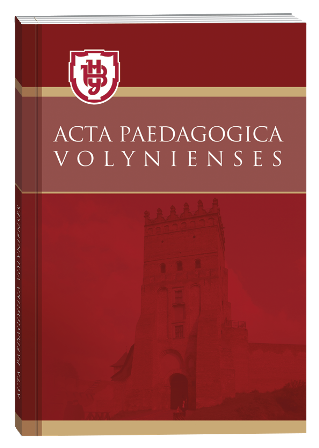USE OF DIGITAL EDUCATIONAL RESOURCES BY PRIMARY SCHOOL TEACHERS
DOI:
https://doi.org/10.32782/apv/2023.2.8Keywords:
primary school, digital resources, digital information sources, digital toolsAbstract
The article states the necessity of using various digital educational resources in the process of teaching junior schoolchildren. The research attention is drawn to the approaches to the interpretation of the concepts of «digital educational technologies», «digital educational resources» and their classification, «digital educational environment». Based on the analysis of the works of domestic researchers and the synthesis of ideas on the use of digital resources in the practice of the new Ukrainian school, one of the approaches to their classification is proposed: digital information sources (various text, illustration, sound, animation materials stored in digital format) and digital tools (applications that provide the ability to work with information sources). The following digital resources were identified as the most appropriate for primary school teachers: platforms for organising on-line conferences (Zoom, Google meet); applications for creating mental maps (memory maps) (Coggle), tests and interactive tasks (Mentimeter, Kahoot! Google forms, Wordwall, Liveworksheets, LearningApps), flashcards for memorising information (Quizlet), interactive video lessons (Unimaster), word clouds (WordArt), interactive posters (Thinglink), webquests (National Educational Platform Vseosvita); on-line whiteboards (Jamboard, Explain Everything); resources for learning mathematics and developing logical thinking (Matific); on-line classes (ClassDojo, GoogleClass); Google Arts & Culture virtual tour service; MozaBook software. The expediency of using the presented digital resources in the practice of primary school teachers is substantiated on the example of specific exercises and fragments of lessons from the integrated course «I Explore the World» for younger students of different years of study. It is noted that such a variety of digital resources does not limit the teacher in the choice of forms, means and methods of teaching, stimulates the choice of applications that would best ensure the implementation of the topic and content of the lesson at different stages and contribute to the formation of key competencies of students.
References
Борисьонок М.О. Взаємозв’язок інформаційно-комунікаційних та цифрових освітніх технологій у процесі підготовки майбутніх учителів початкової школи. Актуальнi питання гуманiтарних наук: Мiжвузiвський збiрник наукових праць молодих вчених Дрогобицького державного педагогiчного унiверситету iменi Iвана Франка. 2022. Вип. 58. С. 229–235. URL : https://bit.ly/3J0PQuo
Васютіна Т.М. Цифрове освітнє середовище у фаховій підготовці майбутніх учителів початкової школи. Професіоналізм педагога в умовах європейських цифрових інновацій. Матеріали Міжнародної науково-практичної конференції, м. Слов’янськ, м. Дніпро, 16–17 травня 2023 року) / відп. ред. О. Хващевська. Слов’янськ, 2023. С. 42–44. URL: https://bit.ly/43MLYXk
Васютіна Т.М., Лідіч А.В. Використання штучного інтелекту СhatGPT у навчанні учнів початкової школи. Сучасні цифрові технології та інноваційні методики навчання: досвід, тенденції, перспективи. Матеріали XI Міжнародної науково-практичної інтернет-конференції (м. Тернопіль, 6 квітня, 2023). Тернопіль. 2023. С. 36–39. URL: http://conf.fizmat.tnpu.edu.ua/media/arhive//21.04.23.pdf
Гринько В. Концептуальні засади проєктування цифрових освітніх технологій у навчанні майбутніх учителів початкової школи. Професіоналізм педагога: теоретичні й методичні аспекти. Вип. 11. Слов’янськ, 2019. С. 107–119. URL: http://profped.ddpu.edu.ua/article/view/197213/197363
Золотаренко Т.О. Використання інтерактивних вправ з сервісу LearningApps для розвитку критичного мислення здобувачів початкової освіти. Сучасні перспективи розвитку науки (частина І): матеріали V Міжнародної науково-практичної конференції м. Київ, 4–5 грудня 2021 року. Київ: МЦНіД, 2021. С. 24–26.
Електронні версії підручників з курсу «Я досліджую світ». URL: https://imzo.gov.ua/pidruchniki/elektronniversiyi-pidruchnikiv/
Електронні інформаційні ресурси: створення, використання, доступ. Збірник матеріалів Міжнародної науково-практичної Інтернет конференції 9–10 листопада 2020 р. Суми/Вінниця : НІКО/ВНТУ, 2020. 280 с.
Олефіренко, Т., Матвієнко, О., Васютіна, Т., Золотаренко Т. Основи організації дистанційного та змішаного навчання у закладах вищої та початкової освіти. Навчально-методичний посібник для студентів спеціальності 013 Початкова освіта. Київ: НПУ імені М.П. Драгоманова. 2022. 145 с. URL: http://enpuir.npu.edu.ua/handle/123456789/36798
Рамський Ю. С. Професійна діяльність вчителя в епоху інформатизації освіти. Науковий часопис НПУ імені М. П. Драгоманова. Серія 2 : Комп'ютерно-орієнтовані системи навчання. Київ : 2015. № 15. С. 23–26.
Hubarieva D., Polisuchenko A., Matviienko O., Savenko O., Hrebnieva I. Information And Communication Technologies In The System Of Distance Education. International Journal of Computer Science and Network Security. 2021 21(11), P. 287–293. URL: http://paper.ijcsns.org/07_book/202111/20211139.pdf
Vasіutina T., Cherednyk L., Klymenko O., Sokur O., Shevchuk A., & Zatserkivna M. New Trends and Strategies For the Integration of Information and Communication Technologies in Educational Activities. IJCSNS International Journal of Computer Science and Network Security, 2021. VOL.21 No. 9, September 2021. P. 169–172 https://doi.org/10.22937/IJCSNS.2021.21.9.23 URL: http://paper.ijcsns.org/07_book/202109/20210923.pdf







